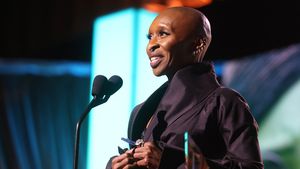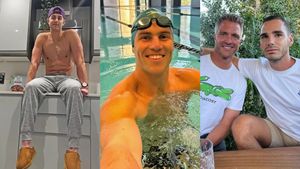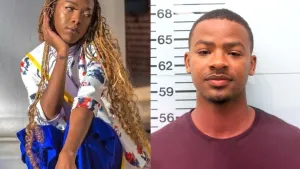 Last week, The View’s Candace Cameron Bure (Full House) and Raven Simone (The Cosby Show) sat down with former Who’s The Boss child star, Danny Pintauro, who recently opened up to Oprah Winfrey about his HIV-positive status. In short, the interview was cringe worthy from beginning to end. Whether it was Simone’s assertion that there are “different ways to catch AIDS,” or Bure’s decision to ask Danny if he takes “responsibility for his promiscuous behavior,” or even Danny’s relatively new role as an HIV-positive advocate, the interview was a train wreck.
Last week, The View’s Candace Cameron Bure (Full House) and Raven Simone (The Cosby Show) sat down with former Who’s The Boss child star, Danny Pintauro, who recently opened up to Oprah Winfrey about his HIV-positive status. In short, the interview was cringe worthy from beginning to end. Whether it was Simone’s assertion that there are “different ways to catch AIDS,” or Bure’s decision to ask Danny if he takes “responsibility for his promiscuous behavior,” or even Danny’s relatively new role as an HIV-positive advocate, the interview was a train wreck.
The truth is, almost every single question that Danny was asked served as an example of what not to ask a person who just revealed their HIV-positive status. And in the hopes that Bure and Simone can pinch off five minutes from watching re-runs of their glory days to read this, let’s correct their horrendous line of inquiries, piece by piece.
After Bure asked Pintauro why he chose now to come out about his status, Simone followed with this:
“It goes back to when you were 27-year-old, and, uh, how did it start? How did the meth problem start.”
Save for some poor wording, there isn’t anything inherently wrong about this question. But as Danny begins to detail his experience with a drug that is plaguing the gay community, he asserts that it isn’t just because he was a former child star, Simone rudely interrupts.
“Stand up for that. Let’s say that again, it is not just because we are child stars that we go through this. It’s not just because of that.”
Yeah, bitch, because this interview is all about you. That’s so Raven. Moving on…
As Pintauro continues to fumble through his answers, Bure asks him to recall the day he found out about his status. Danny begins his story of finding out on his lunch break and returning to work where he finished the shift and went home to cry.
To emphasize this next point, lets stress that Danny’s last sentence ended with “went home and cried.”
This is not the end of the question. It is just the beginning. The process of accepting your status is a long and cumbersome one, and the first day a person finds out is usually a big blur. But instead of pressing Pintauro further on his experiences to invite the audience into what a person goes through when newly diagnosed, she abruptly switches gears.
That’s when it happened.
“I want to know, do you… do you take responsibility for your actions, for being promiscuous, going into a lifestyle of having heightened sex because of the meth that you were using. I want to know what the message is because you are the new, you want to be the new face of HIV.”
First, promiscuity doesn’t cause HIV. Unprotected sex does. A person can sleep with as many people as they want and sleep well at night knowing that they have nothing to worry about. But here is a problem with The View. A journalist conducting an interview shouldn’t have one: a view! Or, at least, a journalist shouldn’t let it be known. Bure fails miserably at this, because we know exactly what her view is, and it is one filled with pseudo-moralizing shame and judgment.
Second, by coming out of the closet and making himself completely vulnerable to the unintentionally ignorant views of people like Simone and Bure, he is “taking responsibility” for his actions. He is sharing his story and holding nothing back so that others who may suffer from the same addictions do not make the mistakes he has made.
Not to be one upped by her View antithesis, Simone chimed in with her now trademark style of tone-deaf zingers.
“There’s also different ways to get AIDS, it’s not just through sex, it’s a lot of different ways.”
Are you tired yet? Because I am tired. Tired of continually correcting these dumb-dumb statements that should be as long gone as Bill Cosby’s career. No, Simone, there is only one way that a person can be diagnosed with AIDS. AIDS is a diagnosis given when a person’s HIV has progressed to advanced stages and their T-cell counts dip below 250. There are many ways to contract HIV, and a person who is diagnosed with HIV today may never be diagnosed with AIDS as long as they stay on the proper treatment.
Simone followed up with a question that wasn’t for Pintauro, but for his husband who was sitting in the audience.
“I have a question for your husband. Please tell me if this is too personal… Um, hi, I have a question for you… You guys have been together for three and a half years, do you have protected or unprotected sex.”
Then, the camera panned toPintauro’s husband, who appeared visibly uncomfortable — and for good reason.
Not only is this too personal, but incredibly offensive and rude. First, she is assuming that his husband is HIV-negative. Second, she is including someone who has not agreed to be interviewed about his HIV status. Third, she missed an incredible opportunity to allow Danny to educate the TV audience. She could have asked the ways in which Danny and his husband stay safe together. She could have asked Danny about the methods he uses to protect himself from transmitting the virus. But no, instead she chose to fumble on the biggest opportunity she had to elevate the discussion around HIV and educate her viewers about how, in 2015, an HIV-positive man or woman can partake in healthy, loving, and virtually limitless sexual and romantic relationships.
Pintauro is new to the game of HIV activism. Therefore, he gets a pass for letting Bure and Simone get away with their stigmatizing approach to questions. But the HIV-positive community will soon expect him to sharpen his responses and quash such an inappropriate and insulting exchange in the future.
Editor's note: Want to help others learn how to talk about HIV and AIDS appropriately? Send them this Plus style guide, which details language that is non-stigmatizing around people living with HIV.

 Last week, The View’s Candace Cameron Bure (Full House) and Raven Simone (The Cosby Show) sat down with former Who’s The Boss child star, Danny Pintauro, who recently opened up to Oprah Winfrey about his HIV-positive status. In short, the interview was cringe worthy from beginning to end. Whether it was Simone’s assertion that there are “different ways to catch AIDS,” or Bure’s decision to ask Danny if he takes “responsibility for his promiscuous behavior,” or even Danny’s relatively new role as an HIV-positive advocate, the interview was a train wreck.
Last week, The View’s Candace Cameron Bure (Full House) and Raven Simone (The Cosby Show) sat down with former Who’s The Boss child star, Danny Pintauro, who recently opened up to Oprah Winfrey about his HIV-positive status. In short, the interview was cringe worthy from beginning to end. Whether it was Simone’s assertion that there are “different ways to catch AIDS,” or Bure’s decision to ask Danny if he takes “responsibility for his promiscuous behavior,” or even Danny’s relatively new role as an HIV-positive advocate, the interview was a train wreck.















































































